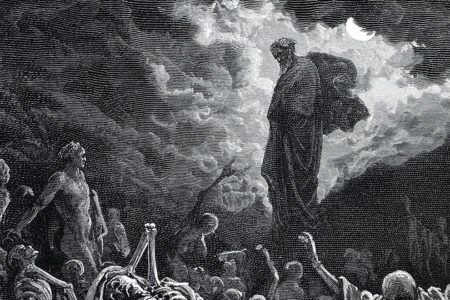Israel’s Political Patchwork
There is a saying in Israel that if you really want to learn about the political situation in the country, the person to ask is a taxi driver. That comment speaks volumes about the special character of Israeli politics. Because a country’s politics reflect the culture of its people, certain characteristics of Israelis in general help us better understand the convoluted political situation in that land.
The first word to remember about Israelis in this regard is their independence. Every Israeli is a politician. Everyone has his or her own definite opinion about an issue. Taxi drivers know, or at least think they know, more than any government official or army general. This independent attitude has resulted in a proliferation of political parties to fit the diverse views of the populace. The Knesset (parliament) has had, at various times, from one to two dozen parties and factions in its membership. Whereas American leaders often bemoan the low turnout on election days, Israeli citizens are eager to exercise their vote. Israelis may be opinionated, but they surely cannot be called uninvolved in their country’s activities. Recently, my Israeli tour guide informed me that he could not work with me in the future because he had just been elected deputy mayor of his home city.
The second characteristic to remember about Israelis is their informality. Israel is known as an open collar society. Only one prime minister in its 45-year history, Menachem Begin, always appeared in public with a coat and tie. Knesset debates lack the polite protocol seen in the U.S. Congress. Speakers are constantly interrupted, and debates sometimes become shouting matches. Israeli leaders do not closely follow the formalities of detail on state occasions. Teddy Kollek, of Jerusalem, attends a large number of dedications, memorials, and special events. He is known to nap on the platform at most of them. No one is offended at this improper behavior. Such is the informality of the society.
The third word to remember about Israelis is their information. Israelis are news hounds. They voraciously devour the newspapers, along with radio and TV news broadcasts. They are a highly informed people. Furthermore, because the country is small and everyone serves in the military, there is a high probability that the average citizen knows personally some famous Israeli. I once mentioned the Israeli actor Topol, and my guide remarked, “Oh, yes, I know Chaim [his first name]; we serve in the same reserve unit.”
These characteristics of independence, informality, and information combine to create the unique political mix that characterizes Israeli life.
With these factors in mind, let’s attempt to untangle the twisted strands of Israeli politics. You must be prepared, however, to disregard any preconceived ideas about your own country’s governmental structure being the standard for all other countries. Americans tend to think that their country’s government must provide the pattern for the world community. They take the attitude that the way they do it is the right way! Remember that we, as Westerners, are trying to understand a Middle Eastern country that is heavily populated by people of European descent. Israel is actually composed of immigrants from nearly 150 countries. Furthermore, the nation did not have a lot of time to develop its governmental structure. Because the State of Israel was born under severe duress in 1948, during a time of war and without an orderly transition from colonial rule, the country’s government had to be installed without first holding lengthy negotiations about the format it would take. The quasi-governmental institutions of the pre-state, combined with old Turkish and British forms, were transformed overnight into the new government of Israel. With this fact in mind, consider the following as an introductory guide to Israel’s government.
1. Israel’s government is the closest to a democracy in the Middle East. Every Arab country in the neighborhood is either a monarchy (e.g., Jordan and Saudi Arabia), an oligarchy (e.g., Kuwait), a dictatorship (e.g., Iraq), or a puppet-state (e.g., Lebanon). In these countries, the concept of democracy is viewed as a “Western” ideal, foreign to Islam, which is the dominant religion.
The only other country in the region that approximates a democracy is Egypt, but there the military actually determines whether or not the country’s president will continue. Israelis, however, determine by popular vote who will lead their country. Although Israel is not a pure democracy (an ideal that does not truly exist anywhere), it does have a representative government that is elected and removed by popular vote.
2. Israel’s government is modeled on the British parliamentary structure. The one legislative body is the Knesset, a Hebrew word meaning assembly. It consists of 120 members and is led by a speaker, who is elected by the Knesset members. The head of the government is the prime minister, who leads the party or coalition that received the most popular votes. The current prime minister Yatzhak Rabin, head of the Labor Coalition. The prime minister chooses his cabinet, which is made up of members of his own party or coalition. The cabinet members are usually members of the Knesset.
Israel also has a president, who plays an important but largely ceremonial role (roughly equivalent to the monarch of Great Britain). The president, however, is elected by the Knesset when a new government is formed. The current president is Ezer Weizman. Many political leaders are former officers in the Israel Defense Forces. For example, Prime Minister Rabin was chief of staff during the Six–Day War in 1967 and President Weizman headed the Air Force.
3. Israelis elect parties, not individuals. This is one of the biggest differences between Israeli and American elections.
Americans vote for the individual who is the choice of their party to run for president, governor, senator, etc. Israelis do not vote in national elections for a prime minister or a Knesset member; they vote for a party. Each party, at its own convention, puts forth a list of names. According to the percentage of votes that the party receives in the election, it receives that percentage of the 120 seats in the Knesset. For example, if the Labor Party received 50 percent of the popular vote, it would receive 60 seats in the Knesset. The top 60 names on Labor’s list would receive Knesset seats. The person who was first on the list would become prime minister. He would then choose approximately 12 individuals to serve in his cabinet as minister of defense, minister of interior, minister of education, etc.
This seems very simple and straightforward, but in Israel nothing stays simple. The problem is that no single party in the history of Israel’s elections has ever won a majority of the votes (at least 50 percent). This leads us to the next factor of Israel’s political travails.
4. Israeli governments have always been formed by a coalition of political parties. For an elected party to form a government, it must receive at least 51 percent of the popular vote, or at least 61 seats in the 120-member Knesset. No party, however, has ever received such a majority in a national election. Therefore, to form a government, the party with the greatest number of votes seeks to form a coalition with other parties to gain at least 61 seats in the Knesset. Sometimes a coalition consists of three or more parties in its cabinet. All coalition members are expected to vote for the government’s agenda. Membership in a coalition, however, often comes with a price tag.
The Labor Party and its coalition members were dominant from 1948 to 1977. This was the party of David ben Gurion, Moshe Dayan, Golda Meir, and other founders of the State of Israel. Through its various related agencies (the Histadrut Labor Federation, the Kupat Holim Medical Organization, and the Solel Boneh Construction Company) it controlled the daily life of Israelis for 29 years.
In 1977 the Likud coalition, headed by Menachem Begin, won the election and led the country until 1984. In general, the Likud was more hawkish than Labor and tended to favor the small religious/nationalist parties. Yet it was under a Likud government that Israel’s only peace treaty with an Arab country—Egypt—was signed.
In the 1984 election, not even a coalition of parties could form a majority. Therefore, a unity government was formed, with Likud and Labor sharing power. Finally, in June 1992 the Labor coalition ousted Yitzhak Shamir’s Likud, and Yitzhak Rabin currently leads the Labor government of Israel.
Many believe that the rising star on Israel’s political scene is Benjamin Netanyahu, head of the Likud and their probable candidate in the next election, which will occur in 1997 or earlier. Early elections could come before Labor’s five-year term expires if one or more of the smaller parties abandons the Labor coalition. This would cause it to lose its majority and force the Labor government to fall, necessitating a new election.
5. Israeli politics are in serious need of reform. Israel lacks a formal constitution. The Declaration of Independence, ratified on May 14, 1948, calls for equality for all of its citizens—Jews and Arabs alike. A series of basic laws passed by the Knesset over the years has formed the basis of Israeli law.
Many Israelis, however, are more concerned with the power that small parties can wield in a coalition government. Some small religious parties with only three seats can actually determine whether or not a coalition remains in power. Their attitude is: If you want us to remain in your coalition, you must agree to our agenda. If not, we will leave. This has taken place on a number of occasions in Israel’s history; therefore, the power of small parties extends far beyond the number of Israelis who actually voted for those parties.
All of these factors underscore an often-quoted cliché about life in Israel: “Never a dull moment!” While the political system frustrates many, Israeli humor often helps soften the feelings. Consider the following anecdote:
Two Israelis, Moshe and Amos, met on the street in Tel Aviv. Moshe announced to Amos that he was leaving the country, probably never to return.
Knowing that Moshe was an ardent patriot, Amos could not believe the news. “What is it?” Amos asked, deeply concerned. “You have a good job, a nice apartment—you love it here. What’s making you leave?”
“I have two reasons,” Moshe answered. “First, I just can’t stand the government anymore. They’re driving me crazy. I can’t take Rabin. I can’t take the rest of them. I’ve got to get out.”
“Okay, okay,” Amos said, understanding and placating. “I know what you mean. I can’t stand this government, either. But be patient. The Likud party will be back in power in another year or so.”
“That’s the second reason,” Moshe said.
This brief look at the intricacies of Israeli politics (and we have only scratched the surface) graphically points out an evident truth: There is an obvious need for the Messiah to come and take control of this confusing situation. Isaiah described the Messiah and His role as follows: “For unto us a child is born, unto us a son is given, and the government shall be upon his shoulder; and his name shall be called Wonderful, Counselor, The Mighty God, The Everlasting Father, The Prince of Peace. Of the increase of his government and peace there shall be no end, upon the throne of David, and upon his kingdom, to order it, and to establish it with justice and with righteousness from henceforth even forever” (Isa. 9:6–7).
O Lord, hasten that day!








